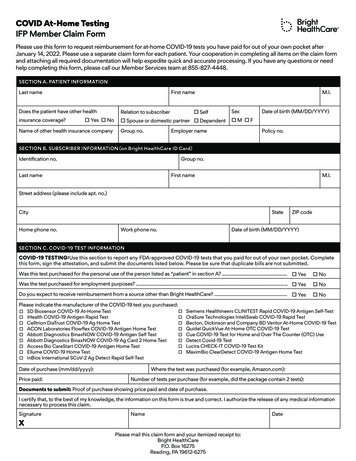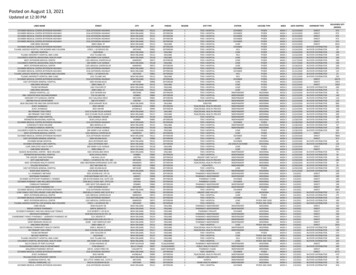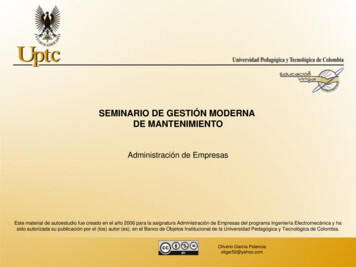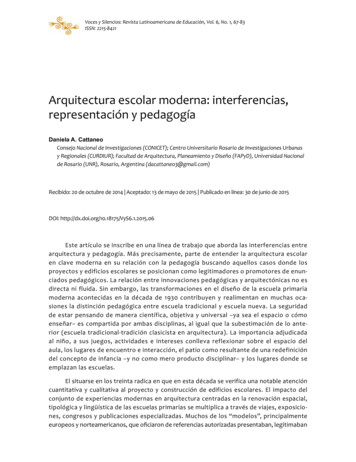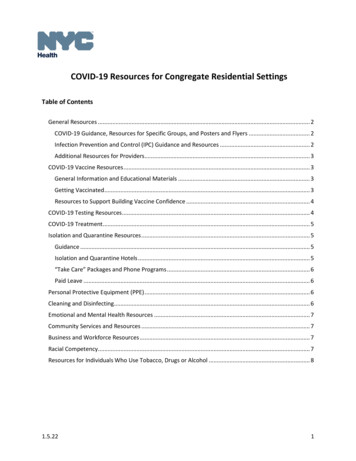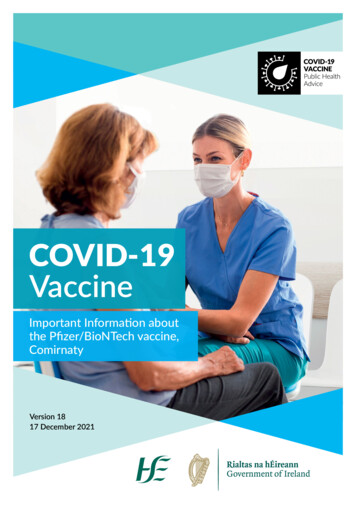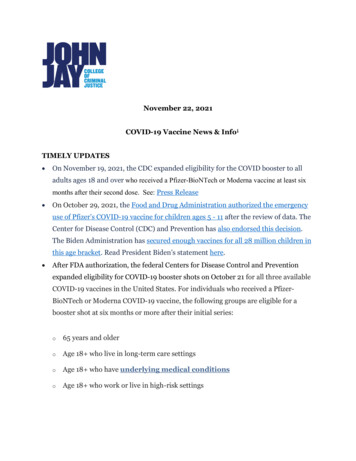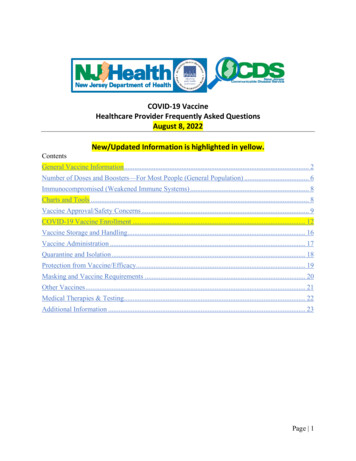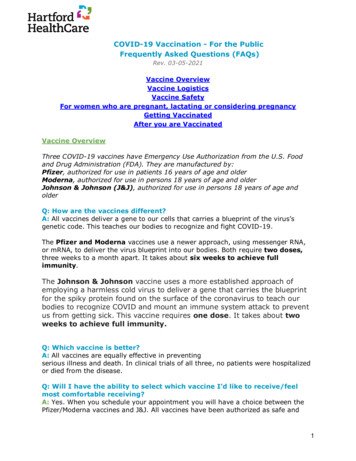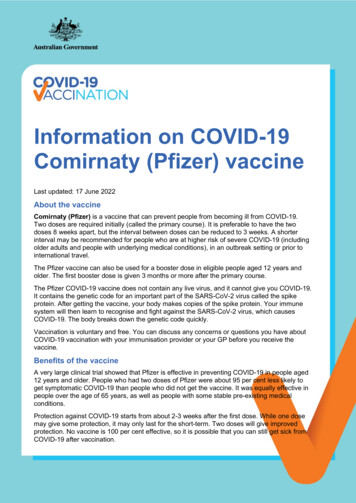
Transcription
Information on COVID-19Comirnaty (Pfizer) vaccineLast updated: 17 June 2022About the vaccineComirnaty (Pfizer) is a vaccine that can prevent people from becoming ill from COVID-19.Two doses are required initially (called the primary course). It is preferable to have the twodoses 8 weeks apart, but the interval between doses can be reduced to 3 weeks. A shorterinterval may be recommended for people who are at higher risk of severe COVID-19 (includingolder adults and people with underlying medical conditions), in an outbreak setting or prior tointernational travel.The Pfizer vaccine can also be used for a booster dose in eligible people aged 12 years andolder. The first booster dose is given 3 months or more after the primary course.The Pfizer COVID-19 vaccine does not contain any live virus, and it cannot give you COVID-19.It contains the genetic code for an important part of the SARS-CoV-2 virus called the spikeprotein. After getting the vaccine, your body makes copies of the spike protein. Your immunesystem will then learn to recognise and fight against the SARS-CoV-2 virus, which causesCOVID-19. The body breaks down the genetic code quickly.Vaccination is voluntary and free. You can discuss any concerns or questions you have aboutCOVID-19 vaccination with your immunisation provider or your GP before you receive thevaccine.Benefits of the vaccineA very large clinical trial showed that Pfizer is effective in preventing COVID-19 in people aged12 years and older. People who had two doses of Pfizer were about 95 per cent less likely toget symptomatic COVID-19 than people who did not get the vaccine. It was equally effective inpeople over the age of 65 years, as well as people with some stable pre-existing medicalconditions.Protection against COVID-19 starts from about 2-3 weeks after the first dose. While one dosemay give some protection, it may only last for the short-term. Two doses will give improvedprotection. No vaccine is 100 per cent effective, so it is possible that you can still get sick fromCOVID-19 after vaccination.
SARS-CoV-2 could potentially still infect a vaccinated person. Even if they have no symptomsor only mild symptoms, they could still pass it on to others. However, the COVID-19 vaccinescurrently used in Australia are effective in reducing the likelihood of a vaccinated persontransmitting the virus to close contacts if the person is infected.This is why after vaccination it is important to continue other preventative measures like: physical distancinghand washingwearing a face maskCOVID-19 testing and quarantine/isolation as required by your state/territory.If you have been vaccinated with Pfizer, you should still get a COVID-19 test if you havesymptoms that meet testing criteria according to your local health authority (such as fever,cough, sore throat).Safety of the vaccinePfizer has been safely given to hundreds of millions of people around the world. Spikevax(Moderna) and Pfizer COVID-19 vaccines both have a very rare risk of heart inflammation(myocarditis or pericarditis). This is more commonly seen in males aged under 30 years afterthe second dose. In some countries, myocarditis and pericarditis have been reported morecommonly after Moderna than after Pfizer.Most people who have had these conditions after their vaccine have recovered fully. Thebenefits of vaccination outweigh this very rare risk and vaccination is still recommended for alleligible age groups.For current information on the frequency and severity of myocarditis and pericarditisfollowing Moderna and Pfizer, please refer to the Australian Technical Advisory Group onImmunisation Weekly COVID-19 meeting updates, available at the Department of Healthwebsite: www.health.gov.au/news.Who can receive this vaccinePeople aged 5 years and older can receive the Pfizer COVID-19 vaccine for their primarycourse.For more information about vaccination in children aged 5 to 11 years see the Pfizer consentform for parents and guardians of children aged 5 to 11 years.People aged 12 years and older can receive Pfizer vaccine for their booster dose.People aged 16 years and older can receive Pfizer vaccine for their winter dose.Booster dosesA booster dose refers to an additional vaccine dose after the primary vaccine course. It isintended to strengthen and prolong protection against COVID-19.Pfizer is recommended as a booster for people aged 16 years and older.People aged 12 to 15 years can have Pfizer as a booster if they: are severely immunocompromisedhave a disability with significant or complex health needshave complex and/or multiple health conditions that increase the risk of severe COVID19.Booster doses are not recommended for people younger than 12 years at this stage.health.gov.au/covid19-vaccines2
Some people at high risk of severe illness from COVID-19 are recommended to have anadditional winter booster dose from 4 months after the first booster.For more information on booster and winter doses ster-dosesStaying up to dateTo be considered up to date with COVID-19 vaccination, you must have completed all thedoses recommended for your age and health status.Find out about how to stay up to date with COVID-19 vaccines -up-to-dateWho should not receive this vaccineYou should not receive this vaccine if you have had: anaphylaxis (a type of severe allergic reaction) to a previous dose of an mRNA COVID19 vaccine (i.e. Pfizer or Spikevax (Moderna))anaphylaxis after exposure to any component of the vaccine, includingpolyethylene glycol (PEG)any other serious adverse event that, following review by an experiencedimmunisation provider or medical specialist, was attributed to a previous dose of anmRNA COVID-19 vaccine (i.e. Pfizer or Moderna) and without another cause identified.Precautions for vaccinationPeople with certain conditions may need additional precautions such as staying for 30 minutesof observation after having their vaccine or consulting an allergy specialist. Tell yourimmunisation provider if you have had: an allergic reaction to a previous dose or to an ingredient of an mRNA COVID-19vaccine (i.e. Pfizer or Moderna)anaphylaxis to other vaccines or to other medicines. Your provider can check toensure there are no common ingredients with the COVID-19 vaccine you are receivingconfirmed mastocytosis with recurrent anaphylaxis that requires treatment.If you have a bleeding disorder or you are taking a blood-thinning medication(anticoagulant), tell your immunisation provider. Your immunisation provider can help determinewhether it is safe for you to have an intramuscular injection and help decide the best timing forinjection.Special circumstances to discuss before vaccinationPeople with precautionary conditions for PfizerPeople with a history of any of the following conditions can receive Pfizer but advice should besought from a GP, immunisation specialist or cardiologist about the best timing of vaccinationand whether any additional precautions are recommended: Recent (i.e. within the past 3 months) myocarditis or pericarditisAcute rheumatic fever (i.e. with active myocardial inflammation) or acute rheumaticheart diseaseAcute decompensated heart failure.Tell your doctor if you had myocarditis or pericarditis diagnosed after a previous dose of Pfizeror Moderna.health.gov.au/covid19-vaccines3
People with weakened immune systems (immunocompromise)People with immunocompromise includes those who have a medical condition that weakenstheir immune system. It also includes those who may be taking medications that suppress theirimmune system. Pfizer is not a live vaccine. It is safe in people with immunocompromise.People with severe immunocompromise are recommended to have a 3rd dose of Pfizer for theirprimary course. Severely immunocompromised people aged 16 years and over who received a3rd primary dose are recommended to receive a booster dose (i.e. 4th dose) at 3 months, inline with the timing for the general population. Severely immunocompromised people arerecommended to receive a winter dose from 4 months after the first booster dose.People with immunocompromise, including those living with HIV, have a higher risk of severeillness from COVID-19, including a higher risk of death.Clinical trials for Pfizer did not include people with immunocompromise, except for a smallgroup of people with stable HIV. We do not know if Pfizer is as effective in people withimmunocompromise compared to the rest of the population. It is possible that Pfizer might notbe as effective in people with immunocompromise as it is in the general population. It isimportant to continue other preventative measures such as physical distancing aftervaccination.Women who are pregnant or breastfeedingWomen and adolescents who are pregnant should be routinely offered Pfizer or Moderna atany stage of pregnancy. If you are trying to become pregnant you do not need to delayvaccination or avoid becoming pregnant after vaccination.Pregnant women with COVID-19 have an increased risk of severe illness and adversepregnancy outcomes. Real-world evidence has shown that Pfizer is safe for pregnant womenand breastfeeding women.If you are breastfeeding, you can have Pfizer. You do not need to stop breastfeeding aftervaccination.Pregnant women aged 16 years or older who received their primary COVID-19 vaccinationcourse 3 or more months ago are recommended to have a booster dose. Some people aged12-15 years can also receive a booster dose.People with a history of COVID-19If you have had COVID-19 in the past, tell your doctor or immunisation provider. You shouldwait 3 months after a confirmed SARS-CoV-2 infection to have a COVID-19 vaccine dose.If you have ongoing illness from COVID-19, discuss the best timing of vaccination with yourtreating doctor.Pfizer and childrenPfizer has been provisionally approved for use in people aged 5 years or older and cannot begiven to younger people.Ensuring the safety of PfizerThe Therapeutic Goods Administration (TGA) assesses all vaccines in Australia. This ensuresthat, in order for a vaccine to be approved, it is safe, effective and manufactured to a very highquality standard. A description of the process for approval of COVID-19 vaccines is available onthe TGA website.The safety of COVID-19 vaccines will be monitored continuously throughout the COVID-19vaccination program.health.gov.au/covid19-vaccines4
You can report suspected side effects to your vaccination provider or other healthcareprofessional. They will then make a formal report on your behalf to your state or territory healthdepartment or directly to the TGA.If you would prefer to report it yourself, please visit the TGA website for information on how toreport suspected side effects associated with COVID-19 vaccines.health.gov.au/covid19-vaccines5
have complex and/or multiple health conditions that increase the risk of severe COVID- . Tell your doctor if you had myocarditis or pericarditis diagnosed after a previous dose of Pfizer . The Therapeutic Goods Administration (TGA) assesses all vaccines in Australia. This ensures that, in order for a vaccine to be approved, it is safe .
